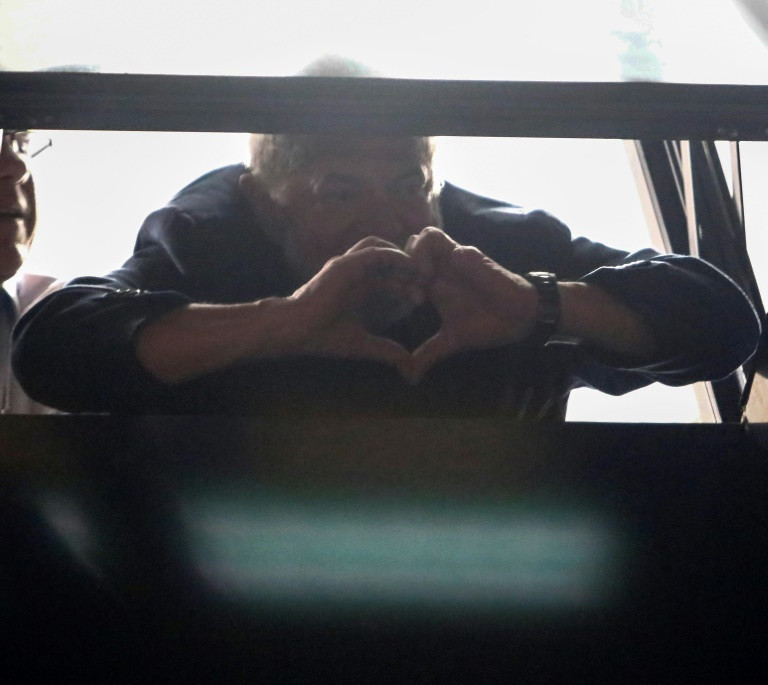
Former Brazilian president Luiz Inacio Lula da Silva greets supporters at the metalworkers' union building in Sao Bernardo do Campo, just hours before he must comply with an order to surrender and begin serving a 12-year prison sentence or face arrest.(Photo: AFP)
Ex-president Luiz Inacio Lula da Silva, the controversial frontrunner in Brazil's October presidential election, remained defiantly holed up Friday as a deadline for him to surrender and start a 12-year prison sentence for corruption loomed.
Shut up in the metalworkers' union building in his hometown Sao Bernardo do Campo, near Sao Paulo, 72-year-old Lula had barely five hours left to comply with the order for voluntary surrender -- or face forcible arrest.
The deadline was 5:00 pm (2000 GMT) Friday.
Hundreds of fervent supporters, many wearing the red shirts of Lula's leftist Workers' Party, stood watch in and around the building, vowing to shield the man who was once one of the world's most popular politicians and who easily leads polls for Brazil's upcoming election.
"Lula is innocent, Lula for president!" the crowd chanted.
Renata Swiecik, an unemployed mother of four who had joined the human shield, urged Lula not to hand himself over.
"We are here to resist to the end. Lula will not be a prisoner in 2018, he'll be president and help the people once more," Swiecik, 31, said.
Lula, convicted last year of taking a luxury apartment as a kickback from a big construction company, has not spoken publicly since Judge Sergio Moro issued his dramatic arrest warrant on Thursday.
Moro, head of Brazil's labyrinthine "Car Wash" anti-graft operation, gave Lula 24 hours to turn himself in to police in the southern city of Curitiba.
Moro said the cell, a separate room with its own toilet, had already been prepared, and that Lula would not be handcuffed -- if he came quietly.
Lula however told the respected Folha newspaper -- which reached the former president at the union building in Sao Bernardo -- that he will refuse to compy with Moro's order. There was no way to confirm the report.
- Battle in the courts -
Moro's offer was portrayed as a gesture of respect to Lula, who was president from 2003-2011 and left office with sky high ratings after overseeing a period of economic growth and dramatic reductions in extreme poverty.
However, Lula's lawyers said Moro was trampling over due process.
They applied to the Supreme Tribunal of Justice overnight demanding that the arrest warrant be suspended while they file a technical appeal at a lower court. If granted, this would give Lula until early next week without fear of arrest.
They also called on the United Nations human rights body in Geneva to intervene, saying that Lula had not been given an opportunity to appeal his prison sentence in freedom.
Earlier this week, Lula's defense tried to convince the Brazilian Supreme Court to let him remain at liberty while he pursued lengthy appeals in higher courts -- potentially taking many months -- and campaigned for election.
But in a marathon session, the Supreme Court said that because Lula had already lost a lower court appeal in January, he must pursue all further appeals from behind bars.
Despite all his legal problems, Lula remains by far the highest polling of any candidate for the October 7 elections, with a hard-right former army captain, Jair Bolsonaro, in a distant second place.
Brazil's left sees Lula's imminent imprisonment as a plot to prevent the Workers' Party from returning to power. Party leader Gleisi Hoffmann said the Supreme Court's denial of Lula's petition violated "constitutional law and the presumption of innocence" and made Brazil "look like a little banana republic."
However, there were celebrations on the right and among prosecutors supporting the "Car Wash" probe, which has revealed systemic, high-level embezzlement and bribery throughout Brazilian business and politics over the last four years.
To them, Lula epitomizes Brazil's corruption-riddled elite. His conviction is "Car Wash's" biggest scalp by far.
Operation "Car Wash" was named after the service station where agents initially investigated a minor money laundering scheme in 2014, before realizing that they'd stumbled on a gargantuan web of embezzlement and bribery at state oil company Petrobras and right through the political classes.
Lula, who grew up poor and with little formal education before becoming a trade union leader and politician, has always said he will go down fighting.
In theory, once someone has been convicted and lost a lower court appeal, he or she is barred from running for office under Brazil's clean-slate law.
Still, even in prison, Lula has the right to register as a candidate. It would then be up to the Superior Electoral Tribunal to rule on whether his candidacy could stand.
Although Lula would be almost certainly blocked, he could use the process to maintain his political influence.


